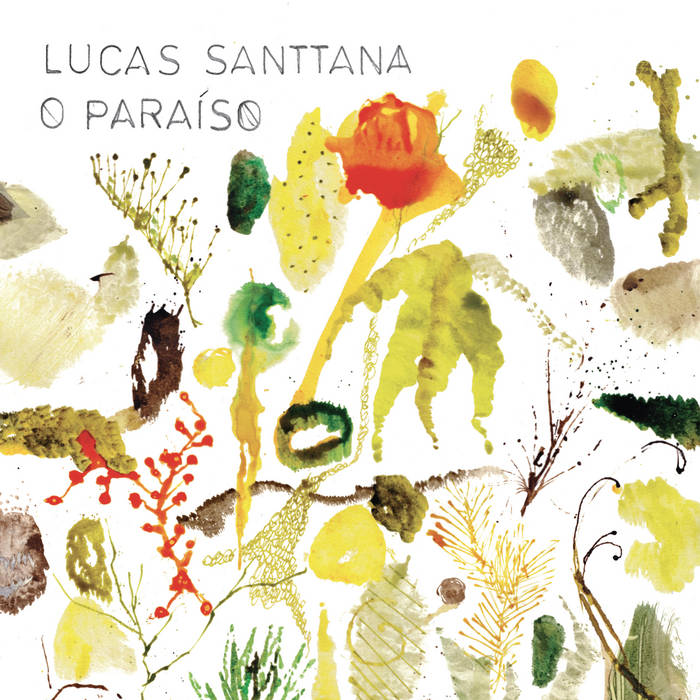The Breakdown
It seems a long while since Lucas Santtana first pushed to the front of listening lists beyond the Bahia with his first Mais Um releases. The natural flow of his songs, his giddy experimentation and ability to dig the finest grooves may have come as a surprise at the time but with a back story connecting him to the Tropicalia legends (his dad Roberto Sant’Ana produced Veloso, Gil and Ze) something special should have been expected. Perhaps that provenance also goes someway to explain why as a song-writer and solo-artist he has refused to tread water.
Consequently the release of his new album ‘O Paraiso’ on No Format brings with it an element of curiosity that heightens the anticipation. There have been hints of a more tranquil direction in his music since signing for the French label in 2014, a swing back to the simplicity and direct warmth of the acoustic guitar, smooth vocals and elegant strength of those samba sounds. In an interview at Womex 2021 when asked about his new recordings he had responded cryptically, ‘We’re living in a time in which everybody is talking loud. I thought the time had come to whisper into people’s ears.’ Well ‘O Paraiso’ isn’t exactly hushed but it takes root in the lush arrangements and suave melodies of Brazil’s post Tropicalia soundscape and branches out confidently into the slick heeled crispness of contemporary Euro-pop.
The sound of thinking aloud in What’s Life? immediately captures the ambition of Santtana’s latest fusion adventure. Inspired by the words and ideas of evolutionary biologist Lynn Margulis, the track announces itself with a vocoder call ‘We are the nature’, reaching out to trademark Air or even Kraftwerk (think ‘We are the robots’). From there the effortless rhumba roll tumbles in, all acoustic guitars and shuffling percussion, while Santtana’s relaxed vocal calmly makes some heavy proposals. ‘Life is not a theme, it’s a process’ he explains, echoing the eminent Margulis as synth flutters mingle with the Bahian rhythms and gentle nudge of the brass section.
The Francophone electro pop influence simmers nearer the surface on the bouncy synth chugger La Biosphere. Sung in French by Santtana with a slight pleading urgency to question the environmental choices we face, the lyrical depth is again presented in a persuasively smooth blend. Arranged by co-producer Fred Soulard, its finger popping swing, gently hugging horns and breezy hook given extra vim by children’s pop choir Les Petits Chanteurs from Asnières,.
Equally zippy is the collab with the spirited MPB star Flavia Coelho on Muita Pose, Pouca Yoga where the pair trade lines with switchback precision over a strident samba pumped up by ska-leaning horn jabs. Like many of the songs on ‘O Paraiso’ the polished surface of Muita Pose, Pouca Yoga disguises a sharp political commentary delivered with lyrical intent. Salvadorian film-maker Daniel Lisboa gets a magnanimous writing co-credit for the phrases from his subversive street posters that Santtana uses to frame this sly dig at our instagramable ways. ‘Much pose, little yoga’ sounds like a hit in every sense.
With such serious undercurrents, it’s a credit to Santtana and co-producer Soulard’s lightness of touch that ‘O Paraiso’ remains buoyant and playful. The band they assembled in Paris for the recording, which includes cellist Vincent Segal and Brazilian percussionist Ze Luis Nascimento, inject joyful enthusiasm and fine-tuned sensitivity into every song. On the title track the agile batacuda rhythms provide the necessary momentum without overpowering some intricate orchestration while shimmering vibes and muted horns wash Vamos Ficar Na Terra with a woozy Mediterranean sway. Even more sumptuous the version of Jorge Ben’s Errare Humanum Est unwinds to looping waves of rippling horns, which add an inspired conclusion to this already timeless classic.
The album’s other cover wanders through McCartney’s Fool On The Hill with an assured drift drawing spirit from Sergio Mendes seminal sixties version. It’s an undemanding slice of pop samba, given a further sprinkle of individuality by Flore Benguigui’s distinctive voice which hovers effortlessly around that most familiar melody. Characteristically Santtana doesn’t dwell in this more orthodox zone for long, rounding off ‘O Paraiso’ with a trio of more stripped back originals that thrive in their less complex presentation. The gentle jazz ballads A Transmissão and No Interior de Tudo have an uncanny medative power that flows from this uncluttered approach. A soft marimba, the light horn breezes, a soulful sax, these are songs with the intimacy of friendly conversation, reflecting on difficult issues. When closing track Sobre la Memoria brings the strands of ‘O Paraiso‘ together in an understated tempo shifting samba that’s bathed in the sound of rain and birdsong, you are left with a feeling of completeness but also some uncertainty.
So maybe Santtana has reached a destination here, this is not so easy listening. For all its sophistication and seamless delivery there’s something very human and fallible at the heart of his new album. O Paraiso is an intriguing record and the deeper you go beneath the surface the more interesting in gets.
Get your copy of ‘O Paraiso’ by Lucas Santtana from your local record store or direct from: https://lucassant.bandcamp.com/album/o-para-so














No Comment